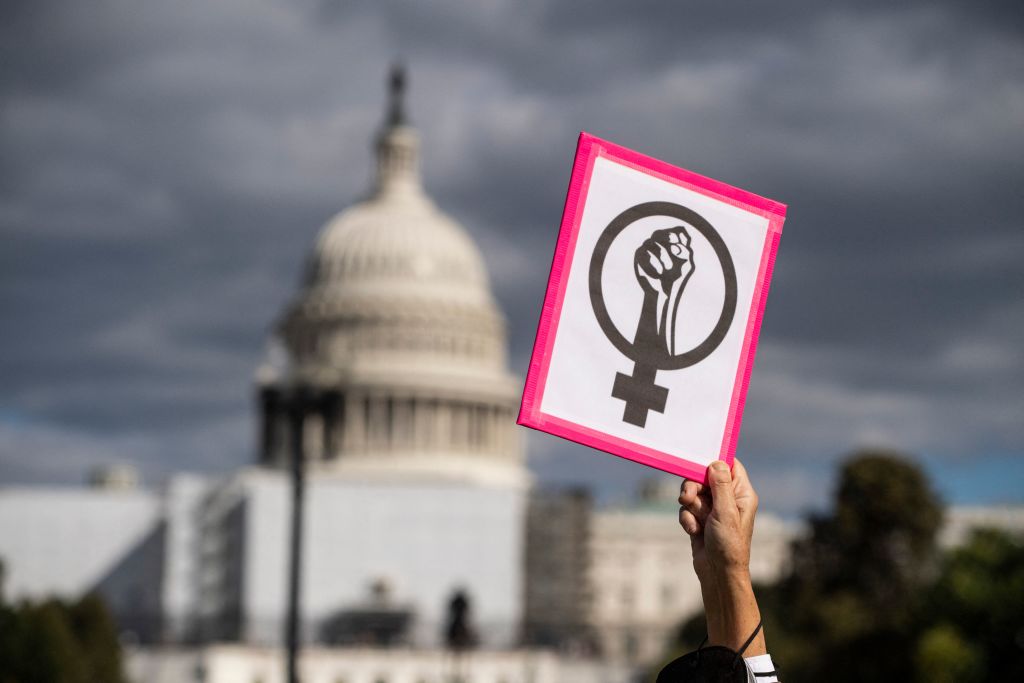
In nearly all states where the question was on the ballot on Tuesday, voters moved to protect abortion access—a major victory for abortion-rights supporters after the Supreme Court’s decision in June, overturning Roe v. Wade and eliminating the constitutional right to an abortion.
“Voters are rejecting the Supreme Court’s reversal of Roe and issuing a clarion call that they want their rights constitutionally protected,” Nancy Northup, president and CEO of the Center for Reproductive Rights, said in a statement, calling Tuesday’s ballot measures “an example of what is possible for other states.”
Kentucky, Michigan, Vermont and California all voted to protect abortion rights, while the results of a ballot measure in Montana are still pending.
These are the states that had abortion-related measures on the ballot:
Kentucky
In deeply red Kentucky, voters rejected a measure that would have excluded abortion rights from the state’s constitution. It would have amended the document to say that “nothing in this Constitution shall be construed to secure or protect a right to abortion or require the funding of abortion.”
About 53% of voters opposed the measure, while about 48% voted in favor.
The outcome won’t immediately affect abortion access in the state, but it signals where most voters stand on the issue after the Republican-led state legislature passed a ban on abortion after 15 weeks of pregnancy, with no exceptions for cases of rape or incest. The state Supreme Court is currently considering a legal challenge to that abortion ban.
“This is a victory for bodily autonomy and the right of all Kentuckians to make the best decisions for themselves, but the fight is not over,” Amber Duke, interim executive director for the ACLU of Kentucky, said in a statement. “We will now continue our fight in state court to restore abortion access in the commonwealth.”
It was similar to the outcome in Kansas in August, when voters overwhelmingly rejected a measure that would have amended the state constitution to say it did not contain a right to an abortion.
Both ballot measures provide an example of how abortion-rights advocates can use ballot measures to protect abortion access moving forward, even in Republican-leaning states.
Michigan
Michigan was one of three states—along with Vermont and California—that voted to protect the right to abortion by enshrining it in the state constitution, which abortion-rights advocates hailed as a “a seismic win.”
About 56% of Michigan voters supported a measure that will establish a “new individual right to reproductive freedom,” including the “right to make all decisions about pregnancy and abortion.” About 44% of voters opposed the measure.
The amendment is expected to invalidate a 1931 abortion ban still on the books in Michigan.
“Post the Supreme Court overturning Roe v Wade, state constitutions are really the vehicle, the mechanism for protecting abortion rights in every individual state,” says Elisabeth Smith, director of state policy and advocacy at the Center for Reproductive Rights, who spent Monday door-knocking around Detroit, encouraging people to vote “yes” on Michigan’s ballot measure.
Michigan Governor Gretchen Whitmer, a Democrat, also won reelection Tuesday, after abortion became a central issue in her campaign. Her Republican challenger, Tudor Dixon, supported an abortion ban except if a pregnant patient’s life is at risk, and she did not support exceptions for cases of rape or incest.
Whitmer had prioritized abortion access as a campaign issue and vowed to continue vetoing anti-abortion legislation as governor.
“For three and a half years, the threat of my veto is what has kept Michigan pro-choice, frankly, with the legislature that we have,” Whitmer told TIME during the summer, describing the stakes of her reelection campaign.
Vermont
Vermont will also amend its state constitution to include “an individual’s right to personal reproductive autonomy,” after more than 75% of voters supported the measure.
The measure had broad support in the state, including from Republican Gov. Phil Scott.
“It is more important than ever to make sure the women in our state have the right to make their own decisions about their health, bodies, and their futures,” Scott said in July, announcing that the proposal would appear on the ballot.
California
California voters supported a measure that will enshrine abortion rights in the state constitution, with 65% voting in favor and 35% in opposition.
The amendment says that the “state shall not deny or interfere with an individual’s reproductive freedom,” including “their fundamental right to choose to have an abortion and their fundamental right to choose or refuse contraceptives.”
The measure was put on the ballot following the U.S. Supreme Court’s decision in Dobbs v. Jackson Women’s Health Organization, which turned abortion rights back to the states.
Montana
In Montana, results are still pending on a referendum that would declare an embryo or fetus a legal person entitled to medical care if they are “born alive” at any stage of development, including after attempted abortions.
Health care providers who violate the law would face a fine of up to $50,000 and 20 years in prison.
Opponents of the measure, including the Montana Medical Association and other medical groups, argue it would negatively affect people with severe pregnancy complications and would criminalize doctors who provide palliative care to newborns with fatal health conditions.
More Must-Reads from TIME
- Cybersecurity Experts Are Sounding the Alarm on DOGE
- Meet the 2025 Women of the Year
- The Harsh Truth About Disability Inclusion
- Why Do More Young Adults Have Cancer?
- Colman Domingo Leads With Radical Love
- How to Get Better at Doing Things Alone
- Michelle Zauner Stares Down the Darkness
Write to Katie Reilly at Katie.Reilly@time.com



